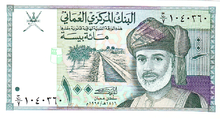Paisa
The paisa (Nepali: पैसा, Hindi: पैसा, Urdu: پیسہ) or poisha (Bengali: পয়সা, in Bangladesh) is a monetary unit in several countries; cognate terms include baisa (Arabic: بيسة, in Oman).
In India, Nepal and Pakistan, the paisa currently equals 1⁄100 of a rupee. In Bangladesh, the poisha equals 1⁄100 of a Bangladeshi taka. In Oman, the baisa equals 1⁄1000 of an Omani rial. The colloquial term for money in Burmese, paiksan (ပိုက်ဆံ), derives from the Hindi term paisa.[1]


The word paisa is from Hindi and Urdu paisā, a quarter-anna coin, ultimately from Sanskrit term padāṁśa meaning 'quarter part', from pada "foot or quarter" and aṁśa "part".[2][3] Another explanation is that the word derives from Spanish and Portuguese ´pesa´ from which peso and diminutive peseta are derived. The pesa was also in use in colonial Kenya.
Until the 1950s in India and Pakistan (and before 1947 in British India), the paisa was equivalent to 3 pies, 1⁄4 of an anna, or 1⁄64 of a rupee. After the transition from a non-decimal currency to a decimal currency, the paisa equaled 1⁄100 of a rupee and was known as a naya paisa ("new paisa") for a few years to distinguish it from the old paisa that was 1⁄64 of a rupee.
Terminology
In Hindi, Afghan Persian, and other languages, the word paisa often means money or cash. Medieval trade routes that spanned the Arabian Sea between India, the Arab regions and East Africa spread the usage of Indian and Arabic currency terms across these areas.[4] The word pesa as a reference to money in East African languages such as Swahili dates from that period.[4] An example of this usage is the older day Kenyan mobile-phone-based money transfer service M-Pesa (which stands for "mobile pesa" or "mobile money").
References
- ^ Myanmar-English Dictionary. Myanmar Language Commission. ISBN 1-881265-47-1.
- ^ "paisa". Free Merriam-Webster Dictionary. Merriam-Webster. Retrieved 3 February 2015.
- ^ "pada". spokensanskrit.de (version 4.2). Retrieved 3 February 2015.
- ^ a b Jeffreys, M. D. W. (1953). "Cowry: Ndoro". NADA: The Southern Rhodesia Native Affairs Department Annual (30). Government of Southern Rhodesia. Retrieved 3 February 2015.
...currency terms pesa, upeni, mali, khete, tickey all derive from Hindu or Arabic currency terms still in use in what was once called the Erythraean Sea
External links
 Media related to Paisa (coins) at Wikimedia Commons
Media related to Paisa (coins) at Wikimedia Commons
